
8 low intensity workouts
Low intensity workouts are a great way to stay fit and keep your muscles active. You may think of these workouts as a more casual warm up, but they can be incorporated into any fitness routine and provide many benefits. Low-intensity exercise is defined as being at 50%-69% of maximal heart rate since this percentage is enough to create a training effect. They includes:
1. Strength training
This workout does not have to be done in a gym. You can do one at home just by using your body weight for resistance, or you can simply do strength training with weights. Strength training helps maintain muscle mass which is crucial when trying to lose weight since it is easier to burn fat than build muscles. Depending on how often you workout, doing two or three sets of 10-15 repetitions will help you see results faster.
Strength training benefits are many. The most obvious benefit is the increase in muscle mass, which boosts your overall metabolic rate. This means that you can burn more calories simply by maintaining existing muscle tissue. Other benefits of strength training include better postural support, enhanced bone health and injury prevention.

2. Stretching
Stretching is an important part of low intensity workouts since it helps prevent injury. Proper stretching also increases flexibility, enhances muscle performance and improves circulation which can all improve your physical health. Studies have shown that short sessions of 5-10 minutes of stretching can provide benefits like improved mood state, enhanced cardiovascular function and pain relief.
How to do it:
Begin by standing on your left foot with your right knee bent towards the ground. With both hands, grab your right ankle and pull it up until you feel a stretch in the back of your thigh. Hold for 30 seconds then switch legs.

3. Aerobic exercises
Although considered low intensity workouts, they are very good for improving cardiovascular health as well as burning fat at a fast rate. They may be slow but they will help you reach your weight loss goals quickly if combined regularly with strength training and stretching sessions.
The most common aerobic exercise is jogging or running since it works your whole body while building endurance that can help you complete other tasks throughout the day easier. Other examples of aerobic exercises include biking, swimming, using the elliptical machine, brisk walking or hiking.
Aerobic workouts work because they help you burn calories through the intensity of the workout itself. Although it is not as intense as high-intensity exercise, it boosts your metabolism by increasing your heart rate and respiratory system activity for extended periods after working out.

4. Yoga
Yoga is an excellent low intensity workout that helps improve balance and flexibility while toning muscle groups in your body. It also has many health benefits like reduced stress levels, improved breathing capacity and better postural support similar to regular strength training sessions. Similar to stretching workouts before aerobics, yoga helps prepare your body for more intensive workouts.
The most common type of yoga is Hatha Yoga, where the poses are held for longer periods of time and you can feel a burn in your muscles immediately after each session. If this sounds like it is not the right workout for you, do not worry! There are many other types of yoga that may be more suitable to your needs.

5. Stair Climbing
This low intensity workout does not require any special equipment or facility so it can be done anywhere without worrying about other people around you. Simply take the stairs instead of using an elevator or escalator while at home, work or in a shopping mall. It is possibly one of the most effective exercises since it uses your whole body while still providing low impact workout on muscles and joints.
If taking the stairs is not possible due to space constraints, try running up and down some flights of steps for 10 to 15 minutes 3 times per week. You can set yourself a number of steps to climb each time or just aim for around 100 steps before resting. As you get stronger, increase this number so you are continuously challenging yourself with new workouts.

6. Weight Training
Weight training workouts are known to help improve muscle strength and size, increase bone density and boost your metabolism. The most common types of weight training exercises include bench presses, triceps dips, bicep curls with dumbbells, leg press machines and military presses using barbells. Although these can be high impact on joints like knees or shoulders if done incorrectly, they can also be low intensity workouts when performed regularly over time in moderation.
To avoid injury due to incorrect form or poor equipment use, always remember to stretch before beginning your workout session. This ensures that all muscles are warmed up properly so they do not get pulled by doing certain exercises. Ensure you have enough space around you when exercising so there is no risk of crashing into anything or anyone while you are working out.

7. Swimming
It is widely known that swimming is one of the best low impact workouts since it exercises almost every single muscle group in your body without putting any strain on joints like knees and ankles. Many people who suffer from arthritis claim it has helped them reduce their pain while others use swimming to strengthen their leg muscles after an injury like a broken bone or torn ligament.
Swimming laps back and forth in a leisurely fashion will tire you out quickly, but this is also a great way to get used to the water and determine if this workout is for you. If it sounds too difficult, try walking or floating on your back while holding onto the side of pool. Gradually increase your speed and distance over time so you can improve your cardiovascular health without hurting yourself. If swimming outdoors, always make sure there are enough lifeguards around when you plan to swim in open waters like oceans or lakes.

8. Walking
Walking is another low intensity workout that does not require any special equipment or training. All you need to do is put one foot in front of the other as quickly as you can, ensuring your head and shoulders are straight and upright. Stretch out well before beginning to make sure your muscles are working properly and you don't pull or strain anything during the walk.
If walking is not enjoyable for you, try jogging slowly while keeping your arms by your side and ensuring there is enough room around you so nobody gets knocked over (or needs to dodge out of the way). Aim for around 10 kilometers per day at a slow pace which increases the intensity but still feels comfortable enough for beginners.
Combining moderate intensity cardio workouts like jogging or skipping with low impact workouts can help reduce the risk of injury, especially if you are just starting out at new sport which involves lots of jumping around.




Leave a comment
This site is protected by hCaptcha and the hCaptcha Privacy Policy and Terms of Service apply.